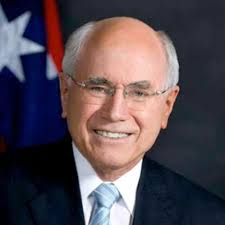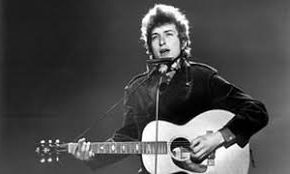
Former Australian Prime Minister John Howard would be a most interesting man with whom to sit down for a good chat over a cup of tea. But he is a very poor choice as patron of the Deafness Forum. MICHAEL UNIACKE comments.
DEAFNESS IS DIVERSE, complex, subtle and paradoxical. Those who become patrons of a deafness organisation need to be profoundly aware of it and be sensitive to its nuances. A good patron will be aware of the history of deafness, how it affects the present, and of what faces deafness in the future.
Very good patrons will have a solid understanding of deafness, and a healthy curiosity about it. They will speak for and about deafness, support it, and use their experience and connections to good effect. They will appreciate its factions, but not take sides. They may not necessarily know Auslan, but they would know the fingerspelling alphabet, be able to exchange greetings, and will perhaps be able to conduct a simple conversation in signs.
Outstanding patrons will interpret deafness to the world. Through their speeches and their connections, they will encourage knowledge and insight.
Former prime minister John Howard, who has a hearing impairment, is the patron of the national peak body on deafness and hearing impairment, Deafness Forum.
Mr Howard’s finest hour as prime minister was to stare down the gun lobby after the 1996 massacre at Port Arthur. He pushed through gun control to which progressive Americans point as an example of what to do. On the other hand, Mr Howard sent Australian troops into the horrific military quagmire of Iraq. Right now is the 15th anniversary of the intervention in Iraq, and all over again, Mr Howard’s decision continues to provoke anger. Yes, he was Australia’s second-longest serving prime minister. He was also only the second prime minister to lose his own seat, in the 2007 elections.
Regardless of the pros and cons of Mr Howard’s prime ministership, he remains a divisive figure, precisely what a patron should not be. Patrons should be unifiers, and politically neutral, but this need not rule out former politicians. After the ugly, combative I-win-you-lose bearpit of the Australian Parliament, ex-politicians of all political stripes need sufficient time for their image to soften. The late Malcolm Fraser was an example of a man who went beyond politics. Former Liberal leader John Hewson may yet become another. Former Labor leader Mark Latham has done the opposite, becoming an angry and divisive media figure. For ex-pollies, patronage of worthy causes is their way of redeeming themselves.
At the start of Hearing Awareness Week in 2013, Mr Howard was the keynote speaker. You can watch it here.
Three years later, Mr Howard presented the Libby Harricks Oration, a signature event for the Deafness Forum. Has anyone taken a serious look at what Mr Howard actually said?
His Oration was curiously bloodless. He said nothing memorable, insightful or original about deafness. He was mostly interested in how medical intervention helped him. He said nothing about how hearing impairment affected him personally. He told an amusing anecdote about another prime minister, Billy Hughes, who had a hearing aid.
My distinct impression was of a man struggling to find something interesting to say about hearing impairment. It was not the speech of someone proclaimed as the patron of a deafness organisation. In fact, Mr Howard reproduced large slabs of his 2013 speech. He seemed to have set up a standard template for speaking at deafness events.
The booklet produced by the Deafness Forum to mark his Oration, which you can read here along with his speech, quotes David Leser, a journalist and biographer:
“in reflecting on Mr Howard’s hearing loss and his prime ministership (Leser) wrote that “Great men can break away from the most circumscribed of worlds.” (emphasis in original)
Not so. Leser did not reflect on Mr Howard’s hearing impairment. His long-form journalism piece, written in 1998 and published in the Good Weekend, devoted barely two paragraphs to the topic. The context was to Mr Howard’s habit of taking holidays for 19 years at exactly the same unremarkable and ordinary place north of Newcastle in New South Wales. Leser used it as an example of Mr Howard’s character – as a man of regular, conservative and sober habits.

Far from “reflecting on Mr Howard’s hearing loss”, Leser used hearing impairment as a feint. After revealing Howard’s liking of the music of the singer/songwriter Bob Dylan, Leser contrasted various of Dylan’s lyrics, which it is doubtful Howard ever heard, with the obtuse conservatism Howard had revealed in his political career to that point. That was probably unfair, but it was effective. Leser did not “reflect” on Mr Howard’s hearing loss because he gave the journalist nothing on which to reflect.
In fact Leser’s 1998 portrait of Mr Howard was so subtly unflattering that I’ve seriously wondered whether those on the Oration organising committee actually read it. Maybe the committee decided the one quote was good enough (it appears on the second page of a 13-page document) and no-one would read the full article. Well, you can read it here.
If ever Mr Howard had a chance to reflect on his hearing impairment, his autobiography, Lazarus Rising, gave him an opportunity. He did nothing of the sort. In an autobiography running to almost 800 pages, he referred to hearing impairment in three paragraphs, plus one sentence a couple of pages later. To him, hearing impairment was a minor and insignificant thing.
WHEN YOU READ about public figures affected by hearing impairment, it takes a keen eye to pick up hidden signals. Henry Lawson’s biographies give several examples. In David Leser’s interview, another unflattering reference to Mr Howard was to his performance in foreign affairs, saying he was uninterested and “out of his depth with other cultures”. Leser then quotes the Sydney Morning Herald’s South East Asia correspondent’s description of Howard and his “social unease” when in the Marshall Islands during a 16-nation South Pacific Forum:
“All the leaders were mixing one evening, talking to each other and having drinks . . . Howard just stood in a corner with an Australian patrol boat captain and his mate. He just didn’t seem able to mix. He stayed for an hour and then went to bed.”
That sent my deaf radar pinging off the scale. Yes, Mr Howard may well be socially ill-at-ease. Equally, Mr Howard may have struggled to hear in a noisy social environment, one in which many people may have spoken with heavily accented English. Not hanging around and leaving early is a rational response and one that most people with hearing impairment would understand.
that is the tragedy of John Howard and hearing impairment: he lacked the emotional language to tell how it affected him.
But we will never know if that was the case, because that is the tragedy of John Howard and hearing impairment: he lacked the emotional language to tell how it affected him. At no stage did he reveal what it felt like. For a man so deeply embedded in public life, this belongs to a private place. Revealing the impact of hearing impairment is a courageous, vulnerable and intensely human act, one that reaches out and embraces those who listen.
JOHN HOWARD BELONGS to the old school of hearing impairment, one that regards deafness as something to be conquered. Deafness is a problem; you deal with it; end of story. It must never be used as an excuse. It’s not something you talk about, because we all live in a hearing world, don’t we. If you’re a bit deaf, get it fixed, and move on. When it suits you, drag it out as a sterling example of how you overcame adversity. Otherwise, you conquer it.
It is a tired and narrow perspective. For a patron of a major deafness organisation, it is not good enough. At best, Mr Howard has a marginal link to hearing impairment. At worse, he is clueless. Whose interests are served by having him as patron? What is the payoff, and to whom, of having Mr Howard as patron of Deafness Forum?
Mr Howard’s patronage harks back to the 1980s and the fine old tradition at the time of Liberal party grandees adopting deafness and hearing impairment as their pet charity; think: the late Peter Howson; think: the Calvert-Joneses. And why not? What nobler act could there be, than rescuing helpless deaf kiddies doomed to a world of silence? Mr Howard’s patronage reveals the leadership of Deafness Forum as timid and unimaginative.
I would enjoy a cup of tea and a good chat with John Howard. There is little doubt that in person he is a charming and genuinely interesting man. Those who worked with him on Lazarus Rising describe him as such. However there are other people who are far better suited to the role of a patron in deafness. Of several names I canvassed, one person stood out. Yes, this person is a former politician, was a leader of a political party in the early 2000s, is well informed on social causes, and has a personal connection with deafness.
Will the Deafness Forum take a radical step and appoint Natasha Stott-Despoja as patron? I will not hold my breath.

Having attended the oration that the author speaks of i can tell you it was … strange – he entered, he spoke, he left and his hangers on chased him to and down the elevator to let us know what chummy friends they were with him ..
https://therebuttal2.com/2018/03/24/abelist-we-love-em-anyway/
This may well be your answer.
Great article Michael, Thank you. Kim Muller, Deaf Access, Lodden Mallee.